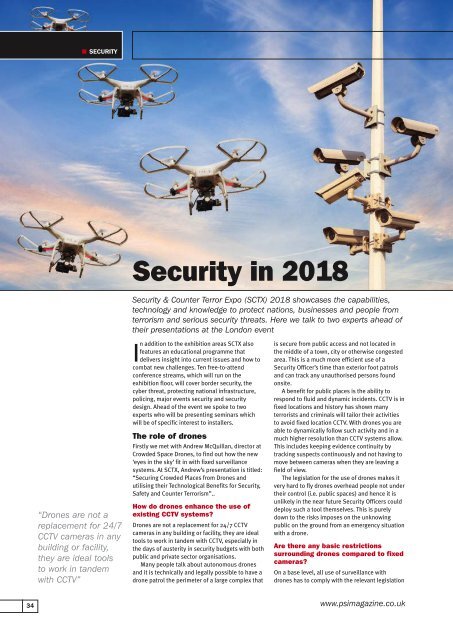PSIFebruary2018
You also want an ePaper? Increase the reach of your titles
YUMPU automatically turns print PDFs into web optimized ePapers that Google loves.
SECURITY<br />
Security in 2018<br />
“Drones are not a<br />
replacement for 24/7<br />
CCTV cameras in any<br />
building or facility,<br />
they are ideal tools<br />
to work in tandem<br />
with CCTV”<br />
Security & Counter Terror Expo (SCTX) 2018 showcases the capabilities,<br />
technology and knowledge to protect nations, businesses and people from<br />
terrorism and serious security threats. Here we talk to two experts ahead of<br />
their presentations at the London event<br />
n addition to the exhibition areas SCTX also<br />
features an educational programme that<br />
Idelivers insight into current issues and how to<br />
combat new challenges. Ten free-to-attend<br />
conference streams, which will run on the<br />
exhibition floor, will cover border security, the<br />
cyber threat, protecting national infrastructure,<br />
policing, major events security and security<br />
design. Ahead of the event we spoke to two<br />
experts who will be presenting seminars which<br />
will be of specific interest to installers.<br />
The role of drones<br />
Firstly we met with Andrew McQuillan, director at<br />
Crowded Space Drones, to find out how the new<br />
‘eyes in the sky’ fit in with fixed surveillance<br />
systems. At SCTX, Andrew’s presentation is titled:<br />
“Securing Crowded Places from Drones and<br />
utilising their Technological Benefits for Security,<br />
Safety and Counter Terrorism”..<br />
How do drones enhance the use of<br />
existing CCTV systems?<br />
Drones are not a replacement for 24/7 CCTV<br />
cameras in any building or facility, they are ideal<br />
tools to work in tandem with CCTV, especially in<br />
the days of austerity in security budgets with both<br />
public and private sector organisations.<br />
Many people talk about autonomous drones<br />
and it is technically and legally possible to have a<br />
drone patrol the perimeter of a large complex that<br />
is secure from public access and not located in<br />
the middle of a town, city or otherwise congested<br />
area. This is a much more efficient use of a<br />
Security Officer’s time than exterior foot patrols<br />
and can track any unauthorised persons found<br />
onsite.<br />
A benefit for public places is the ability to<br />
respond to fluid and dynamic incidents. CCTV is in<br />
fixed locations and history has shown many<br />
terrorists and criminals will tailor their activities<br />
to avoid fixed location CCTV. With drones you are<br />
able to dynamically follow such activity and in a<br />
much higher resolution than CCTV systems allow.<br />
This includes keeping evidence continuity by<br />
tracking suspects continuously and not having to<br />
move between cameras when they are leaving a<br />
field of view.<br />
The legislation for the use of drones makes it<br />
very hard to fly drones overhead people not under<br />
their control (i.e. public spaces) and hence it is<br />
unlikely in the near future Security Officers could<br />
deploy such a tool themselves. This is purely<br />
down to the risks imposes on the unknowing<br />
public on the ground from an emergency situation<br />
with a drone.<br />
Are there any basic restrictions<br />
surrounding drones compared to fixed<br />
cameras?<br />
On a base level, all use of surveillance with<br />
drones has to comply with the relevant legislation<br />
34 www.psimagazine.co.uk

















